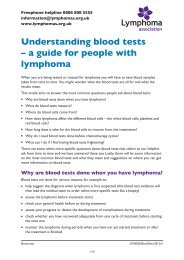Cutaneous T-cell lymphoma - Lymphoma Association
Cutaneous T-cell lymphoma - Lymphoma Association
Cutaneous T-cell lymphoma - Lymphoma Association
Create successful ePaper yourself
Turn your PDF publications into a flip-book with our unique Google optimized e-Paper software.
Taking part in a clinical trialResearchers are continually trying to find out which treatment or combination oftreatments work best for <strong>lymphoma</strong>s. You might be asked to take part in a clinicalresearch trial. Clinical trials are very important because they allow new treatments tobe evaluated and compared with more established ones. Studying treatments like thisis the only way that new and hopefully better treatments can become available. Whenyou are enrolled into a clinical trial you can be assured that you will receive modernand appropriate treatments.There are advantages to taking part in a clinical trial and it is always worth asking yourconsultant if there might be a trial you could take part in. A major advantage is thatsome of the newer treatments are only available if you are in a clinical trial.You don’t have to take part in a trial if you are offered this, however. If you don’t feelcomfortable with the idea of taking part in a trial after discussing all the optionswith your medical team be assured that you will receive the best current standardtreatment available.We have booklet about taking part in clinical trials. If you would like a copy of thisor if you would like to talk to someone about entering a trial please phone thehelpline (0808 808 5555). The booklet can also be downloaded from our website(www.<strong>lymphoma</strong>s.org.uk).Going for hospital check-upsHow often you attend the clinic for check-ups will depend on what kind of <strong>lymphoma</strong>you have, the stage it is assessed to be at and how it is responding to treatment. Ifyou have a slow-growing <strong>lymphoma</strong> at an early stage and it is being observed, or if itis stable or in remission after treatment you would probably only be seen every 6 to12 months. This would probably be your experience if you have mycosis fungoides.If your <strong>lymphoma</strong> is a faster growing type or is continuing to grow (progressing) youmight be seen as often as every 4 to 6 weeks.At the clinic you will be asked about your symptoms and you will be examined.Always let the medical team know if there are any symptoms that have been troublingyou or about any changes in your skin or new swellings that have developed. Youwould only occasionally need blood tests, scans or further biopsies at these visits.You might like to read our other information sheets on skin <strong>lymphoma</strong>s,‘Treatments for skin <strong>lymphoma</strong>s’ and ‘Living with skin <strong>lymphoma</strong>’, whichdescribes ways of coping with the symptoms and other day-to-day practicalitiesof having skin <strong>lymphoma</strong>. If you would like these or if you have any concernsthat you would like to discuss, please phone our helpline (0808 808 5555).This information is also available on our website (www.<strong>lymphoma</strong>s.org.uk).<strong>Cutaneous</strong> T-<strong>cell</strong> <strong>lymphoma</strong>LYM0157/CTCL/2013v315/18












